2014 Nanning World ChampionshipsOct 1, 2014 by Marissa From Gymnastike
World Championships - My Inside Experience
World Championships - My Inside Experience
World Championships - My Inside Experience
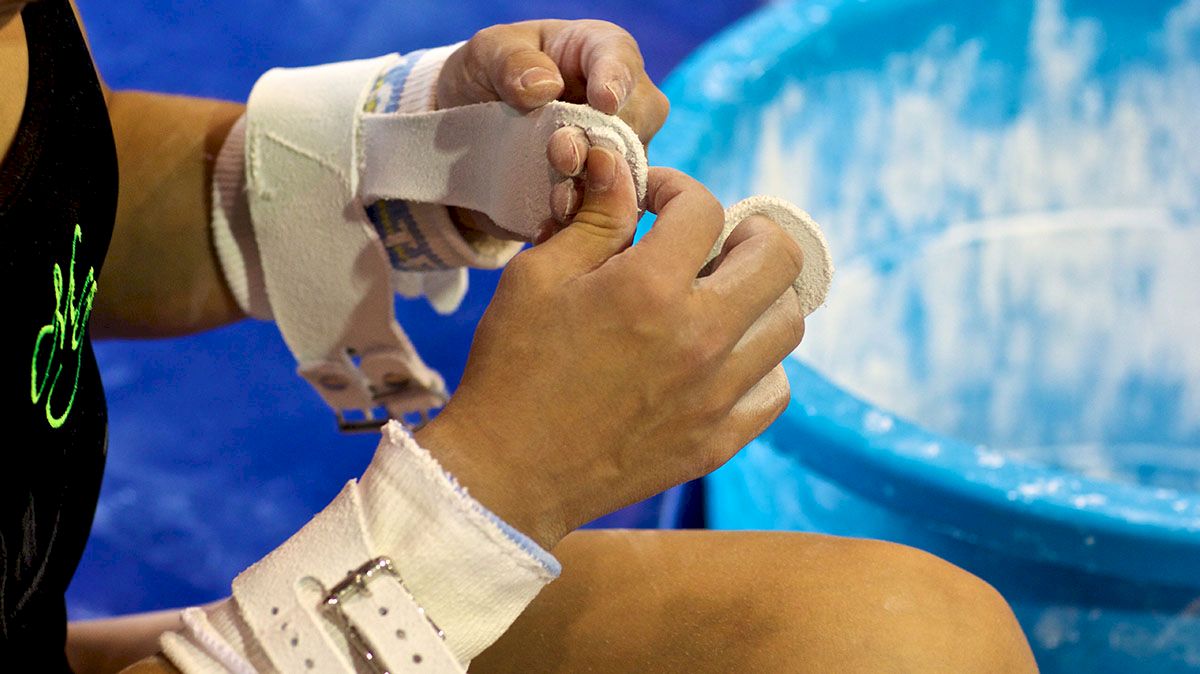
The World Championships in gymnastics sometimes almost feels bigger than the Olympics because there are so many other countries that are invited other than just the top twelve. It’s an exciting event and I was lucky enough to attend two World Championships for Great Britain during my time as an elite gymnast.
One of the most exciting things was traveling to a new and interesting country whether that be in Europe, Asia, South America, etc. Traveling with your team in your country’s gear is pretty special and nothing beats the curious looks or supportive words of luck from people you meet at the airport. There was always a moment where I’d think, I’m representing everyone from my country, each and every single person, it was such an honor. You can never have too much apparel either, it’s like Christmas came early and it becomes your favorite gear that you feel proud wearing at anytime, anywhere.
Training Hall Experience
You have an allotted time to train in the training halls so you are grouped together with other countries that you will see all week until after the team qualifications. You are also allotted a certain training hall which usually changes each day, so you are never in the same location everyday. After qualifications things change. Some countries qualify to team finals and will continue training, and some athletes make individual finals so will continue to train on their own or with other teammates that have also made finals. Usually men and women have separate training halls or the equipment will be on separate sides of the same hall.
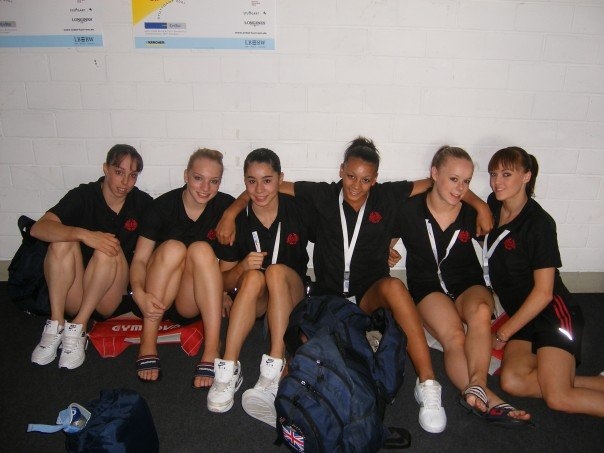

Waiting before practice. From left: Beth Tweddle, Ash Williams, Marissa King, Rebecca Downie, Hannah Clowes and Rebecca Wing.
Training in the training halls is quick and efficient. You only have a certain amount of time so teams get right to it and you are in and out before you know it. It’s exciting seeing gymnasts from other countries and seeing how each country trains and prepares in their own way. Some countries like USA, Brazil, Romania, and Russia I remember had very structured warm ups, others are more laid back and take their time.
Between arriving or leaving the halls, it’s always a pleasure seeing friends or recognizing familiar faces from over the years of competition. You would usually shake hands or bow your head in recognition of one another, or when it came to the French, kissing from cheek to cheek of each person was something I think everyone had to get use to.
It can sometimes get quite competitive. Back at Worlds in 2007 in Stuttgart, the training halls consisted of having one hall with two sets of women’s equipment symmetrical to each other. At the time, Great Britain was on one side of the gym with the same rotation as USA on the other side. In this particular hall, the bars were next to each other and seeing Beth Tweddle and Nastia Liukin training their incredible routines literally right next to each other was especially memorable. Not only because they were both incredible on this event, but because at this particular World Championships, both were looking to claim the event title and they both knew that.
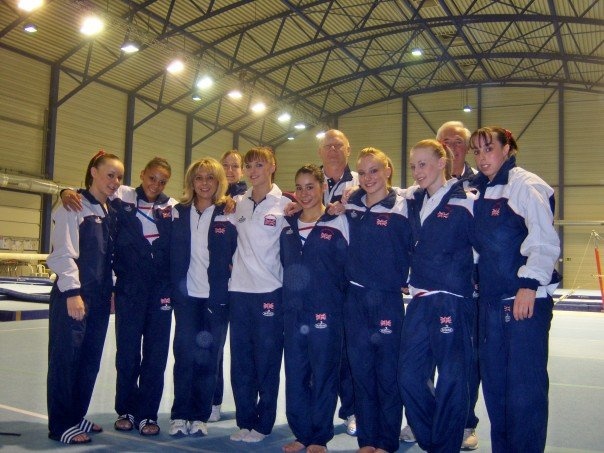
Team GB after training at the 2007 World Championships in Stuttgart, Germany.
It can sometimes get quite competitive. Back at Worlds in 2007 in Stuttgart, the training halls consisted of having one hall with two sets of women’s equipment symmetrical to each other. At the time, Great Britain was on one side of the gym with the same rotation as USA on the other side. In this particular hall, the bars were next to each other and seeing Beth Tweddle and Nastia Liukin training their incredible routines literally right next to each other was especially memorable. Not only because they were both incredible on this event, but because at this particular World Championships, both were looking to claim the event title and they both knew that.

Team GB after training at the 2007 World Championships in Stuttgart, Germany.
Competition
Competition is extremely fun, it’s what we as athletes live for. The great thing about big competitions such as Europeans, Worlds, and Olympics is the elevated equipment on a podium. Ask any gymnast, and they will agree that performing on podium is the absolute best. It makes such a difference.
The worst thing can sometimes be the nervous wait waiting for that green light because you’re trying to stay calm and hold back the impatient urge to start your routine. Over time and with experience, you learn how to manage the time after the last competitor finishes, with the time you need to take off your clothes and prepare yourself before your routine all before the judges are ready and that red light turns to green. An easy mistake is getting up onto the podium too quickly and having to wait a long time before saluting. I did this at my first European Championships and it just made me more nervous and I quickly became cold. However, it's also easy to get up with not enough time to mentally prepare or in one memorable case, a gymnast ahead of me had pulled out at the last minute and I was unaware that I was next. It wasn’t until I saw the green light and 30 seconds was counting down on the screen that I realized and I quickly had to start my routine after panicking and almost having a minor heart attack. Without the mental preparation I fell twice, and picking myself up after was probably one my hardest challenges. At the time, I felt the most prepared on that event and I felt angry that I was rushed before my routine which I believe caused my mistakes.
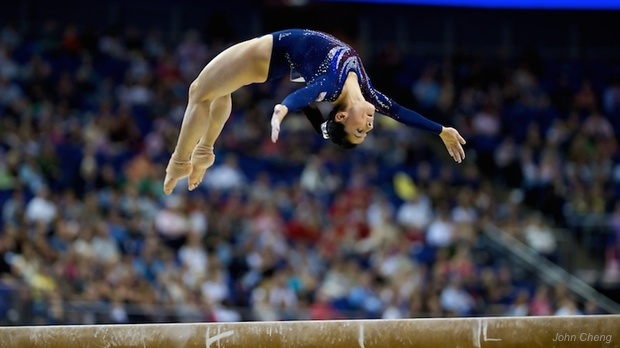
Performing on beam at the 2009 World Championships in London, England.
The worst thing can sometimes be the nervous wait waiting for that green light because you’re trying to stay calm and hold back the impatient urge to start your routine. Over time and with experience, you learn how to manage the time after the last competitor finishes, with the time you need to take off your clothes and prepare yourself before your routine all before the judges are ready and that red light turns to green. An easy mistake is getting up onto the podium too quickly and having to wait a long time before saluting. I did this at my first European Championships and it just made me more nervous and I quickly became cold. However, it's also easy to get up with not enough time to mentally prepare or in one memorable case, a gymnast ahead of me had pulled out at the last minute and I was unaware that I was next. It wasn’t until I saw the green light and 30 seconds was counting down on the screen that I realized and I quickly had to start my routine after panicking and almost having a minor heart attack. Without the mental preparation I fell twice, and picking myself up after was probably one my hardest challenges. At the time, I felt the most prepared on that event and I felt angry that I was rushed before my routine which I believe caused my mistakes.

Performing on beam at the 2009 World Championships in London, England.
Competition can sometimes be more mentally challenging than physically. By the time of competition, you are physically the best prepared you can be and it’s not simply a matter of how talented you are or how much you have trained, but how psychologically prepared you are. These mental aspects include being able to deal with the stress of strong competition. Sometimes seeing other competitors that might be stronger, with bigger skills, more experience, and more confidence can be very intimidating. I remember, for example, seeing Alicia Sacramone and being completely starstruck by her. Her presence, her demeanor, her gymnastics. Not to forget also how incredibly beautiful she is. You start comparing yourself to them, watch them more than you should, and it can encourage you to start doubting yourself. It takes practice to learn how to focus on yourself and not other people who can distract you and cause you to intimidate yourself with faulty thinking.
Mental toughness also includes visualizing your skills and routines, and recovering from mistakes and failure quickly if they occur. You have to determine strategies to tackle tough situations and adjust with each circumstance. Your psychological state reflects on your attitude and behavior, so regardless of a mistake, you have to learn to pick yourself up and collaborate with your team and celebrate the successes of others. It’s also important to not become overconfident and keep positive before, during, and after competition. Mental toughness is extremely challenging and it comes from handling all these types of situations. It’s something that only athletes understand and experience and, ultimately, takes years to master in order to be the best in your sport.
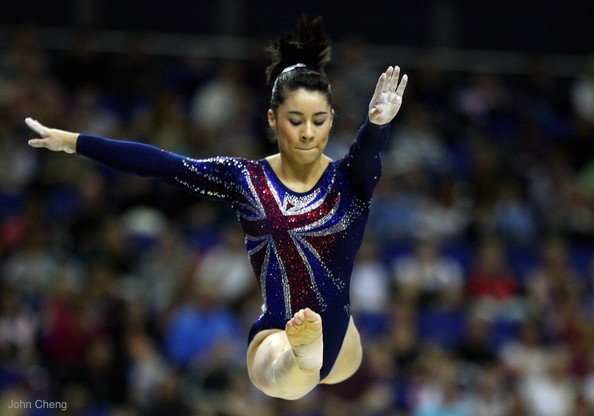
Mental toughness also includes visualizing your skills and routines, and recovering from mistakes and failure quickly if they occur. You have to determine strategies to tackle tough situations and adjust with each circumstance. Your psychological state reflects on your attitude and behavior, so regardless of a mistake, you have to learn to pick yourself up and collaborate with your team and celebrate the successes of others. It’s also important to not become overconfident and keep positive before, during, and after competition. Mental toughness is extremely challenging and it comes from handling all these types of situations. It’s something that only athletes understand and experience and, ultimately, takes years to master in order to be the best in your sport.

After Competition
At the end of competition banquet, it’s always fun to see everyone dressed up and celebrating everyone’s accomplishments and the overall success of the event. It’s also the best time to take pictures and talk to friends you’ve made from other countries who you may have only seen, but not had the chance to actually speak to throughout the week.
Leaving can sometimes be the hardest part, because once you’re home it’s back to the drawing board and a new cycle of preparation starts again. Every World Championships is memorable in it’s own way and even now, the friends I’ve made over the years I continue to keep in touch with despite retiring from elite gymnastics. Just last year, I visited Eleftherios Kosmidis and Vasiliki Millousi in Greece and I've also been to train with Lauren Mitchell in Australia.
Big championships like this is what I miss most, the traveling, the experience, the competition, and the people. Nothing beats the memories, and at the same time, knowing that you were the best in your country at your sport in order to attend such an incredible event. It’s not only a proud accomplishment for yourself, but an accomplishment you share with your coach who works day in and day out with you in order to be the best you can be in your sport. Being selected for a major championship and in some cases, even taking your personal coach with you to the competition, and sharing the success of not only your hard work, but theirs too is something that creates a special bond between athlete and coach. It creates a growing motivation to get back in the gym and strive to become even better and stronger with even bigger goals that, in my case, where beyond anything I thought I could ever achieve.
Big championships like this is what I miss most, the traveling, the experience, the competition, and the people. Nothing beats the memories, and at the same time, knowing that you were the best in your country at your sport in order to attend such an incredible event. It’s not only a proud accomplishment for yourself, but an accomplishment you share with your coach who works day in and day out with you in order to be the best you can be in your sport. Being selected for a major championship and in some cases, even taking your personal coach with you to the competition, and sharing the success of not only your hard work, but theirs too is something that creates a special bond between athlete and coach. It creates a growing motivation to get back in the gym and strive to become even better and stronger with even bigger goals that, in my case, where beyond anything I thought I could ever achieve.